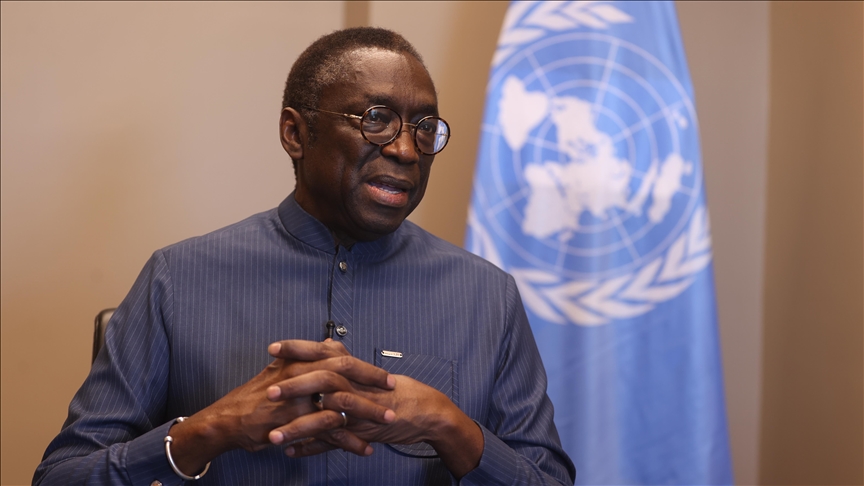Sahel is facing a security crisis but is also ‘a zone of opportunity and hope’: UN coordinator
Sahel crisis is ‘only one characteristic’ of region and does not capture whole reality, says UN Secretary-General's Special Coordinator for development in Sahel

- With the UN supporting Ankara’s soft diplomacy, a win-win partnership could make Türkiye one of the top development and commercial partners in the region, Abdoulaye Mar Dieye tells Anadolu
ISTANBUL/DAKAR, Senegal
Amid escalating violence and instability across the Sahel, the region remains mired in a complex security crisis that threatens millions but also conceals deeper social and economic challenges.
The Sahel’s turmoil stems from a mix of ethnic tensions, weak governance and the spread of extremist groups across the region.
Abdoulaye Mar Dieye, the UN Secretary-General's Special Coordinator for development in the Sahel, said the Sahel crisis is “only one characteristic” of the region and does not capture the whole reality.
“The Sahel is deeper and bigger than the crisis aspect. It is also a zone of opportunity and hope,” Dieye told Anadolu in the Senegalese capital of Dakar.
“But that does not mean I want to downplay the crisis aspect, which is true, which is there, which is real,” he added.
The crisis is often attributed to events in northern Mali, he said, noting that it actually began with the “destruction of Libya,” which fueled the region’s terrorism challenges.
Mali has been battling a prolonged security crisis since 2012, fueled by armed separatist factions and terrorist networks, particularly in the north and center.
“The world has an enormous debt to the Sahelian countries, and this debt is not yet paid,” Dieye underscored.
A ‘purely economic’ crisis
Dieye said the crisis has persisted due to a lack of development, with extremely poor border communities, marked by state absence and poverty, becoming vulnerable to terrorist influence.
He said he interviewed young former terrorists to understand their motivations and found that many lacked basic knowledge of the Quran, suggesting their involvement was not driven by ideology.
“They had no jobs and there were the terrorists giving them a bit of money, so they followed the movements,” he noted.
“The whole mass we see in terrorism, it’s not ideology, it’s purely economic.”
He said it is false to label Africa or the Sahel as poor, stressing that these are extremely rich countries, citing Mali as an example.
According to the World Gold Council, Mali was Africa’s second-largest and the world’s 11th-largest gold producer in 2024.
Proper exploitation of gold alone could double Mali’s GDP, Dieye said, not to mention cotton and other minerals in the country.
“These countries are not poor. It is the management of resources that has been very disastrous in the past, and that is what must be corrected,” he highlighted.
‘Terrorism has no borders’
Dieye said the security risk is not limited to a single country, such as Senegal, but affects all countries, as “terrorism has no borders,” from northern Benin and Togo to as far as Grand-Bassam in Ivory Coast.
He said Senegal has strengthened its military defenses along the Mali border and recognized that combating terrorism requires more than military action, investing heavily in human development and border area modernization.
The UN also supports multi-country projects linking Mauritania, Senegal and Mali, as well as Senegal, Guinea-Bissau and Guinea, to strengthen border communities where terrorism often takes root, Dieye said.
“When there are two borders, it’s easy. But it’s at three borders that it becomes problematic,” he noted.
“Those are the hotbeds where terrorism takes root and grows.”
The UN official said the presence of the two major Sufi religious groups -- Tijaniyya and Mouridism, which promote devotion and oppose violence -- has been a key factor in Senegal’s stability, even as the government remains vigilant against terrorist sleeper cells.
“That is a strong capital for Senegal, for stability -- not only for the fight against terrorism, but for social stability,” he underscored.
Türkiye’s role in boosting regional development and stability
Dieye said soft diplomacy allows deeper engagement because it fosters acceptance, especially in a region rich in extractive industries.
He said he plans to visit a Turkish technology institute to explore collaboration that would help Sahel youth develop advanced tech skills, particularly in industry and mining.
“That is where I think there is a huge niche where Türkiye can invest, because Türkiye is known for its technological development. It is a very advanced country in terms of technology, and I think it’s a promising field,” he noted.
Ankara’s soft diplomacy has earned it a strong presence in the Sahel, with the UN supporting a win-win partnership that could make Türkiye one of the top development and commercial partners in the region, Dieye highlighted.
“In any case, the United Nations system, which also greatly values the partnership with Türkiye, would like to make itself available both to Türkiye and to Sahelian countries to improve economic and social development and political stability in the region,” he added.








